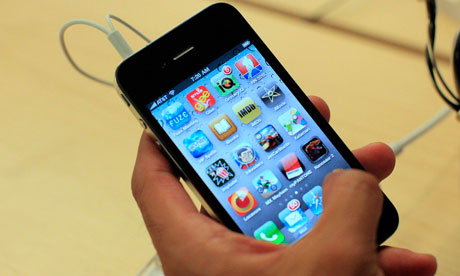
The Finnish phone-maker Nokia could receive a one-off payment of more than €800m (£700m) from Apple and receive further royalties of €8 per iPhone sold in future, after winning a settlement in a long-running patents dispute.
The company subsequently hinted that it may pursue makers of smartphones using Google's Android mobile operating system, of which 36m were sold in the first quarter of 2011.
The settlement signed on Tuesday related to patents for mobile technology that helped Apple to revolutionise the phone industry in 2007 when it launched the first iPhone.
Although terms of the settlement were not disclosed, previous patent licensing deals in the phone industry have been worth up to 5% of the price of the device involved. At €8, or $11.50 (£7), they would represent about 4.5% of the estimated average $264 cost price of an iPhone, which Apple sells to retailers and phone networks for an average of $660. Apple has sold 108m iPhones since their launch.
Nokia's shares rose by 3% as it said that the one-off payment, whose size was not revealed, will have "a positive financial impact" on its upcoming quarterly results.
At the end of May it forecast that its mobile phone division, which for years has been the biggest in the world, would see reduced revenues and might not make a profit for the first time in a decade. The one-off payment should push it back to its usual quarterly profit levels. Ongoing royalties from Apple of about 1% of the average sale price of a handset would be worth about $430m to Nokia this year, analysts estimated.
Nokia may now also choose to sue makers of handsets running Google's free Android mobile operating system if it decides that they have also infringed its patents.
Nokia's chief executive, Stephen Elop, said: "This settlement ... enables us to focus on further licensing opportunities in the mobile communications market."
A spokesman for Apple said: "Apple and Nokia have agreed to drop all of our current lawsuits and enter into a licence covering some of each other's patents, but not the majority of the innovations that make the iPhone unique. We're glad to put this behind us and get back to focusing on our respective businesses."
Florian Mueller, an independent specialist and blogger on patent battles, said that "the deal structure – a one-time payment as well as running royalties – suggests a fairly good outcome for Nokia". He added: "Maybe Nokia could have continued to play hardball and got an even better deal if it didn't face the challenges it undoubtedly has. But this looks like a fairly important victory."
He suggested that Apple would benefit if Nokia pursues Android handset-makers, because they have smaller margins and would be less easily able to afford royalties. Android dominates the smartphone market with a 36% share, ahead of Nokia's Symbian with 27% and Apple's 17%, according to the research company Gartner.
Financial analysts had mixed views on the outcome. Mikael Rautanen, at Inderes in Helsinki, said: "This is the first positive news from Nokia for a long time. They can both focus on their businesses now, and the dispute was settled to Nokia's advantage."
But others remained bearish on the group's longer-term prospects. "This [the Apple deal] could cause the stock to have a bit of a relief rally, but does very little to address the stark reality that the company is facing," Richard Windsor, analyst at Nomura, said.
On Monday, Nomura forecast that Nokia will be passed by both Samsung and Apple in the smartphone market worldwide over the next four months, and that its phone business will shrink by about 20% over the next two years as it tries to shift from Symbian to Microsoft's Windows Phone on smartphones.
"We see no reason to remain anything other than negative on the stock," said Windsor.
Nokia's shares are still down about 25% since 30 May, representing a €5.5bn fall in market capitalisation for one of Europe's biggest technology companies.
The case settled on Tuesday was filed in 2009 by Nokia, which said it had filed a patent 10 years ago that covered the use of touchscreen technology in phones.
Ironically, announcing the iPhone in 2007, Steve Jobs, Apple's chief executive, said of the multi-touch screen interface: "Boy, have we patented it!", in a warning to would-be rivals.
Elop said: "We are very pleased to have Apple join the growing number of Nokia licensees. This settlement demonstrates Nokia's industry-leading patent portfolio and enables us to focus on further licensing opportunities in the mobile communications market."
• This article was amended on 15 June 2011. A heading - Apple to pay Nokia big settlement plus royalties after losing patent case - was changed so it could not be read as suggesting the settlement payment resulted from a court ruling.

